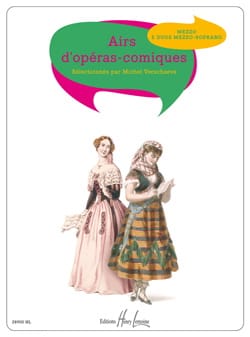PLANQUETTE ROBERT - D’amour, à notre couvent (air de renée) (le talisman)
PLANQUETTE ROBERT - Donnez nous l’hospitalité (duetto renée et léocadie) (le talisman)
MESSAGER ANDRÉ - Fêtons cette journée qui bientôt va finir (duo marie - colette) (la ba
MAILLARD AIMÉ - Grâce à ce vilain ermite.. (couplets de l’ermite, georgette) (les drag
PLANQUETTE ROBERT - J’avais emmené ma négresse… (rondeau-valse d’arabelle) (surcouf)
BOIELDIEU FA - Malheureuse! que faire?.... (récit et duo d’anna et marguerite) (la da
GODARD BENJAMIN - Ne me plains pas chère enfant (berceuse de marion) (la vivandière)
BOIELDIEU FA - Pauvre dame marguerite… (couplets de marguerite) (la dame blanche)
LECOCQ CHARLES - Pendant que vous dormiez encore.. (rondeau des blés, marjolaine) (marj
AUBER DFE - S’il est sur terre un emploi selon moi…. (couplets de jacinthe) (le do
BIZET GEORGES - Sans doute l’heure est prochaine (lamento de djamileh) (djamileh)
MEYERBEER GIOCOMO - Sous les genevriers… (duo des 2 pâtres) (le pardon de ploërmel)
GOUNOD CHARLES - Toute femme tient sous sa patte (couplets de martine) (le médecin malg
LECOCQ CHARLES - Vous avez la tête bien dure mon cher époux (couplets de zobeïde) (ali-
From the show point of view, the French comic opera is, on the whole, a success, and the music plays a role often very pleasant. All this is lively, alert, witty, clever, sometimes sparkling - it sings in all memories, and there is no need to know the rudiment of solfege to delight. The music, almost exclusively melodic, although supported by an orchestra that is both light and transparent, and which never indifferently clings to attention, follows the action with suppleness, wit, and good humor. *
It is in the Airs serious and to drink, the Italian Comedy and in the theaters of fairs that the Opera-Comique confirms its birth, develops and ends up to prevail notably thanks to, at the end of the XVIIe century, with the fairs St-Laurent and St-Germain (which take place from February 3rd to Sunday Passion).
At the end of the year 1714, the Opera authorizes the final name of the Opéra-Comique then composed of Vaudeville (originally Vau de Vire) mixed ariettes.
It is thus the alternation of the spoken and the sung which makes the specificity of the Opéra-Comique unlike the Opera which is sung from end to end. The performers need a solid work of actors allied to vocal qualities more and more demanding. The nineteenth century will produce a considerable number of scores played hundreds of times among which stand out among others: The White Lady (1825) Boieldieu, The Dragons of Villars (1856) Maillard, The Pre Cleric (1832) Hérold, The Wedding of Jeannette (1853) Massé, Lalla Roukh (1862) David or The Postillon Longjumeau (1836) Adam. In our series of collections, we will not fail to propose works before and after these dates, works particularly chosen for their differences (in terms of tessitura, agility, legato, etc.). It was obvious to us, when it was the case, to leave the spoken texts before, during and after the air, which characterizes the very essence of the Opéra-Comique.
The goal of our collections is above all to develop an essential repertoire of the history of French music and to give the opportunity to the performers to develop their vocal and theatrical qualities.
Dr. Michel Verschaeve
* Robert BERNARD, History of Music, Volume II, Editions Nathan, Paris, 1961, p. 621.
 |